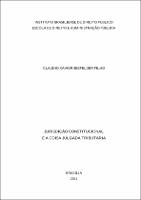Use este identificador para citar ou linkar para este item:
https://repositorio.idp.edu.br//handle/123456789/3423| Título: | Jurisdição constitucional e a coisa julgada tributária |
| Autor(es): | Seefelder Filho, Claudio Xavier |
| Orientador(es): | Pinheiro, Guilherme Pereira |
| Palavras-chave: | Precedente da suprema corte;Jurisdição constitucional;Coisa julgada;Relação jurídico-tributária de trato continuado;Efeitos temporais da coisa julgada;Cessação da eficácia da coisa julgada contrária a precedente da suprema corte |
| Data de submissão: | 2021 |
| Citação: | SEEFELDER FILHO, Claudio Xavier. Jurisdição constitucional e a coisa julgada tributária. 2021. 154 f. Dissertação (Mestrado Profissional em Direito Constitucional) – Instituto Brasileiro de Ensino, Desenvolvimento e Pesquisa, Brasília, 2021. |
| Resumo: | O presente trabalho visa dar uma resposta ao seguinte problema: continuaria o contribuinte a
pagar o tributo em respeito à sua coisa julgada formada em relação jurídico-tributárias de trato
continuado que o declarou constitucional ou pararia de pagá-lo em respeito a superveniente
precedente do STF que o declarou inconstitucional? Raciocínio inverso se aplica em prol da
Administração tributária. Nesse contexto, o presente trabalho analisa o entendimento do
Superior Tribunal de Justiça e, especialmente, do Supremo Tribunal Federal, além da doutrina
sobre a força e impacto do precedente do STF na ordem jurídica e a eficácia da coisa julgada
tributária nas relações jurídicas de trata continuado. Com esse objetivo, abordamos: (i) a
jurisdição constitucional, o papel do Supremo Tribunal Federal, a eficácia vinculativa e
expansiva ultra partes dos precedentes da Corte Suprema no exercício da jurisdição
constitucional, a supremacia e a força normativa da Constituição, a autoridade do STF e o
impacto de seu precedente na ordem jurídica; (ii) a coisa julgada e as distinções entre seu
conteúdo, sua eficácia e seus efeitos, a aplicação da lei ao caso concreto, as espécies de relações
jurídicas, a relação jurídica tributária de trato continuado e a ação declaratória tributária com
efeitos futuros, os limites temporais da coisa julgada e a cláusula rebus sic stantibus e a ação
de revisão do art. 505, II do Código de Processo Civil brasileiro; por fim, (iii) analisaremos o
conflito entre o precedente do Supremo Tribunal Federal e a coisa julgada tributária, abordando
os princípios constitucionais envolvidos. Dessa forma, ao final, o presente trabalho conclui que
sendo o ordenamento jurídico um conjunto de normas que devem convergir, evitando-se a
incoerência e assegurando a supremacia das normas constitucionais, a superveniência de
precedente com eficácia vinculativa e expansiva ultra partes da Suprema Corte impacta a
ordem jurídica fazendo cessar de forma automática os efeitos de coisa julgada tributária em
sentido contrário após o trânsito em julgado no precedente definitivo da Suprema Corte, seja
como órgão exclusivo do sistema concentrado, seja como órgão de cúpula do sistema difuso. |
| Abstract: | The present work aims to answer the following problem: would the taxpayer continue to pay the tax in respect to its res judicata formed in a legal-tax relationship of continued treatment that declared it constitutional or would it stop paying it in respect to the supervening precedent of the STF that declared it unconstitutional? The opposite reasoning applies in favor of the Tax Administration. In this context, this paper analyzes the understanding of the Superior Court of Justice and especially the Federal Supreme Court, in addition to the doctrine on the strength and impact of the precedent of the STF in the legal order and the effectiveness of res judicata tax in legal relations of continuous treaty. To this end, we address: (i) constitutional jurisdiction, the role of the Supreme Court, the binding and expansive ultra partes effectiveness of the Supreme Court's precedents in the exercise of constitutional jurisdiction, the supremacy and normative force of the Constitution, the authority of the STF and the impact of its precedent on the legal order; (ii) res judicata and the distinctions between its content, effectiveness and effects, the application of the law to the concrete case, the types of legal relations, the continuing tax legal relation and the tax declaratory action with future effects, the temporal limits of res judicata and the rebus sic stantibus clause and the revision action of art. 505, II of the Brazilian Code of Civil Procedure; finally, (iii) we will analyze the conflict between the precedent of the Federal Supreme Court and the res judicata, addressing the constitutional principles involved. Thus, at the end, this paper concludes that being the legal system a set of rules that should converge, avoiding inconsistency and ensuring the supremacy of constitutional rules, the supervenience of a precedent with binding and expansive ultra partes effectiveness of the Supreme Court impacts the legal system by automatically ceasing the effects of res judicata in the opposite direction after the res judicata in the definitive precedent of the Supreme Court, either as an exclusive body of the concentrated system, or as an apex body of the diffuse system. |
| URI: | https://repositorio.idp.edu.br//handle/123456789/3423 |
| Aparece nas coleções: | Mestrado Acadêmico em Direito Constitucional |
Arquivos associados a este item:
| Arquivo | Descrição | Tamanho | Formato | |
|---|---|---|---|---|
| DISSERTAÇÃO_CLAUDIO XAVIER SEEFELDER FILHO _MESTRADO EM DIREITO.pdf | 1.3 MB | Adobe PDF |  Visualizar/Abrir |
Os itens no repositório estão protegidos por copyright, com todos os direitos reservados, salvo quando é indicado o contrário.
